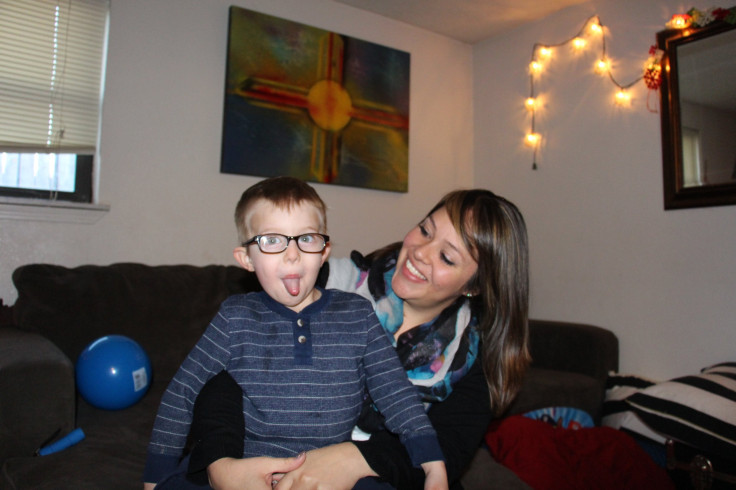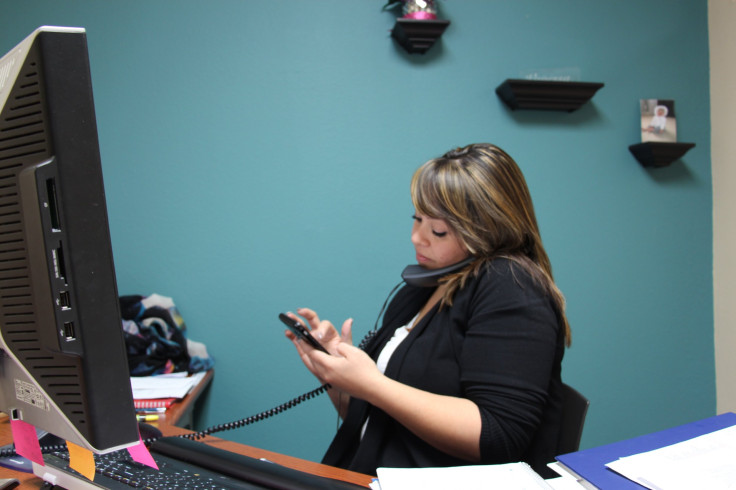Donald Trump's America: Tax Reform Plan Could Hurt Single Mothers With Tight Budgets

ALBUQUERQUE, New Mexico -- Vanessa Asher peers nervously into her son’s mouth with a flashlight for a sign of infection. After a few moments, she turns off the hand-held light and sends her five-year-old son on his way to play. Tanner had complained earlier of an earache, but her son seems healthy now.
Earaches and ear infections are somewhat common for Tanner, a charismatic little boy with blonde hair and blue eyes. And the last thing Asher, a 31-year-old single mother, wants is to worry about him being sick -- or how much it might cost to seek out medical care.

The mother and son live in a modest adobe home in Albuquerque, New Mexico. It's two days after Christmas and a tiny decorated tree still stands in a corner of the living room. While all basic needs are met -- rent, groceries and the funds needed for Tanner’s Montessori school -- money can be tight and budgeting does not necessarily allow for things like vacations, pricey extracurricular activities or health care emergencies. For Asher, paying all of her bills on time can be difficult.
“I always follow the quote, 'borrow from Peter to pay Paul,'" Asher said. "One of my goals was to pay all of my bills, on time and at the same time when they are due. I know I will get there. I see the progress.”
“Progress” is one of the slogans from the Shepard Fairy posters that helped fuel President Barack Obama’s campaign in 2008. Asher voted for him then and again in 2012. But now, Obama will make way for Donald Trump. In just five days, he will be sworn in as the 45th president of the United States, taking charge of the U.S. economy and other policy decisions that could change how Asher makes ends meet.
Single mothers could be hit hardest by Trump's quest to “Make America Great Again.” Trump’s tax reform plan proposed a reduction of “taxes across the board, especially for working and middle-income Americans who will receive a massive tax reduction." But a report from the Urban-Brookings Tax Policy Center published in October concluded the proposed tax changes could actually result in higher taxes for as many as 8.7 million families. Single working parents, most notably, would see a substantial tax increase. Meanwhile, Trump's promise to repeal the Affordable Care Act could also make life harder for single parents.
There are nearly 12 million single-parent families in the U.S., according to the Census Bureau. About 10 million single mothers, like Asher, live with children under the age of 18.
Trump's proposed tax plan includes only three brackets: 12 percent, 25 percent and 33 percent, which means that families could pay higher rates (the lowest tax bracket now is 10 percent). Trump's proposal would eliminate personal exemptions as well as the head-of-household filing status, which eases the burden for unmarried families with child dependents. That means ultimately many single parents could find themselves paying more under his plan.
“A single parent earning $75,000, with two school-aged children and no childcare costs would face a tax increase of around $2,440,” according to the Tax Policy Center report led by Lily Batchelder, a New York University professor of law and public policy and a former tax specialist for the Obama administration who served as majority chief tax counsel for the U.S. Senate Committee on Finance.
A single mother earning roughly $36,000, with one five-year-old child and no child care costs could expect to pay roughly $393 more in taxes under Trump's plan, Batchelder estimated.
The Tax Policy Center analysis has come under fire from the incoming Trump administration for not factoring in all of the benefits that could come from other Trump reforms and for “liberal bias." However, the Tax Foundation, a right-leaning policy think tank, supported Batchelder’s analysis and came to the same results after replicating Batchelder’s numbers.
“Her calculations are good, they seem valid to me,” Alan Cole, an economist at the Tax Foundation who has been closely following Trump's tax policies, told International Business Times.
For Asher, any additional pressure on her finances could be disastrous. There is already so little to work with. Asher’s salary is comprised of a base salary and commission that varies year-to-year due to client renewals and new business. For 2016, she expects to make just under $36,000. Her income after taxes is about $28,300.
"Luckily, I have an amazing landlord and he allows me to pay my rent late every single month," Asher said on a recent day. "The tuition, my car payments and my rent are all due at the beginning of the month, so that is never all paid at the same time. My son’s school allows me to split up the payments into two payments."
Asher and her son's father separated when Tanner was 18 months and it's been mother and son since. Tanner spends two, sometimes three days a week with his father, depending on his dad’s work schedule, but Asher has primary custody. Child support comes in the form of monthly payments, and a chunk of that money is put toward Tanner’s Montessori school tuition.
“I get $500 a month from his dad — $332 goes to school and the rest basically covers gas for me to drive him to and from,” Asher said.
Tanner is covered under New Mexico's Medicaid program until he is six. His health care insurance will then be covered by his father, who receives benefits through work, according to Asher. She herself has no health insurance.
In his outline for healthcare reform, Trump proposed to cap federal funding for Medicaid. There are a little over 2 million people in the state of New Mexico, and more than 700,000 people in the state are enrolled in the federal health care program. Roughly 12. 8 percent of the state's population under 65 are without health insurance.


On a recent bright morning in Albuquerque, Asher pulled into the strip mall parking space where she is employed as an insurance agent for R. Day Agency Farmers Insurance. She gets to work at 8:30 a.m. and will spend the day taking calls with clients and doing some minor training with two new colleagues. She will leave work a little early to pick up Tanner at about 4 p.m.
She has an office to herself and it’s peaceful. It's right outside the waiting room where there is a sign that reads "Know the Gaps." Pictures of Tanner brighten her office walls.
Whatever her financial circumstances, Asher said, she wants to make her dollars work for her son.
“I compromise on being able to pay the minimum payment on my credit card just to use it to pay for something else," Asher said. "And I compromise on gas. When I won’t be able to use my car for the weekend because I won’t get paid until next week, I’ll have to save driving for the work week. So we’ll stay home or walk."”

She doesn't have a plan yet to save for Tanner's college education, preferring to wait and see where his prospective career path might take him.
“My biggest hope for him is that I want him to love and accept himself as he is," Asher said. "I want him to be able to love and accept others... That seems like the ideal way to go through life.”

With so much uncertainty about where the U.S. economy is going, Asher, who became a registered Democrat when she turned 18, said she ultimately decided to vote for Trump in November. She is frustrated with a government that seems broken down and needs to be rebuilt.
She looks forward to Trump stirring the pot “so bad that people start giving a shit,” Asher said.
Asher was won over in part by Trump's pledge to help parents cover the cost of childcare through deductions and incentives, including a childcare rebate and a "tax-free dependent care savings account," as it's described on his campaign website. Like many low-income Americans who backed Trump, she looks forward to Trump fulfilling his promise to create more jobs.
“That’s what would help me, personally, since that’s how I make my income," she said, referring to the commission she makes in insurance.
Other single parents who might be fearful of Trump's America should welcome change, according to Asher.
“People are scared of what’s going to happen. If you don’t know what’s going to happen, then why fear it? Just acknowledge that you don’t know," she said.
© Copyright IBTimes 2024. All rights reserved.






















